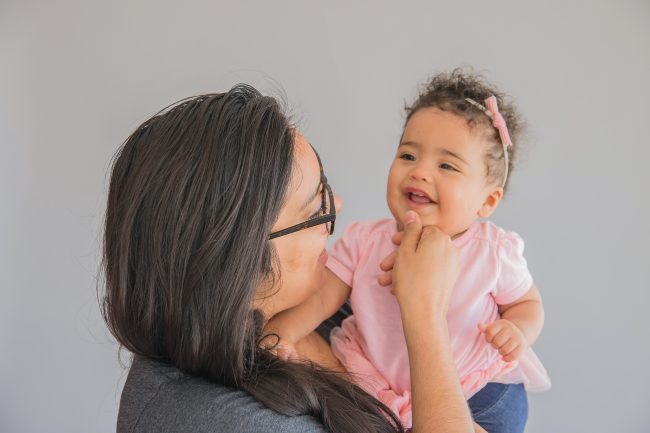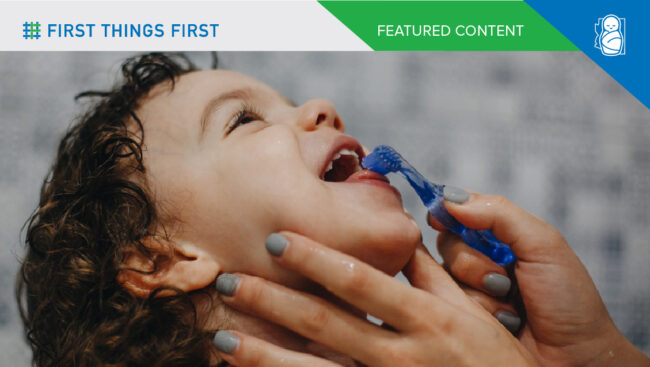Healthy teeth are important, even for babies. Between 6 months and 3 years, children get 20 baby teeth. Even though baby teeth eventually fall out, they help your child eat healthy foods and learn to talk and smile normally. They help the jawbone and face muscles develop, and they hold space for permanent teeth. Start good oral health care from birth, so your baby’s gums are healthy and their first teeth do not have decay. Healthy teeth and gums are important to the health of the whole body.

Take Care of Your Baby’s Gums and Teeth
You can help your baby’s oral health very early, by cleaning their mouth and gums. Wipe your baby’s gums with a clean, damp cloth or gauze pad every day. After a feeding and before bedtime is a good time to clean your baby’s mouth.
When your baby has their first tooth, start to brush two times a day with a smear of fluoride toothpaste about the size of a grain of rice. That is enough toothpaste to use until your baby is 3 years old.
The germs that cause tooth decay can spread from mouth to mouth. Don’t share food, cups, spoons or toothbrushes with your baby. Also don’t use your mouth to clean off a pacifier.
Your baby should have a checkup with a dentist when they have their first tooth, or by their first birthday.

Help When Your Baby Is Teething
Babies can be uncomfortable when their first teeth come through the gums. They can show this by being fussy, drooling more than usual or putting their fingers in their mouths. If your baby has teething pain, you can try a few ways to make them more comfortable:
- Gently rub their gums with a clean finger.
- Give them a chilled, nontoxic teething ring to chew on.
- Give them a clean, damp washcloth that has been chilled.
- Give them a pacifier.

Preventing Tooth Decay
Tooth decay is caused by germs and sugar in the mouth. To help prevent it, don’t let your baby carry around a bottle or sippy cup of milk, juice or sugary drinks between meals. Also don’t put them to bed with a bottle.
Signs of Tooth Decay
The first signs of tooth decay are white spots or lines on the teeth, near the gums. Brown spots are also tooth decay. Take your baby to the dentist if you see these.
About Fluoride
Fluoride is a mineral that makes tooth surfaces harder and helps prevent tooth decay. It is in toothpaste, fluoride varnish and some tap water. A little bit of fluoride is not harmful. Ask your baby’s doctor about fluoride varnish or supplements, starting at 6 months.
Finding a Dentist
Most dentists treat people of all ages. It may be easiest to bring your baby to the same dentist that you see. A pediatric dentist only treats children and is trained to make children comfortable during visits.
If your baby gets health care through AHCCCS, they also are covered for dental care. Talk to their doctor or health plan about how to get dental care. Or you can search at Find-a-Dentist. The Arizona Dental Association has a list of reduced-fee and community dental clinics.
The First Things First Parent Kit was developed in partnership with Health Research for Action/UC Berkeley. © 2023 The Regents of the University of California. Additional video, graphic and other content © 2023 First Things First. All rights reserved.


